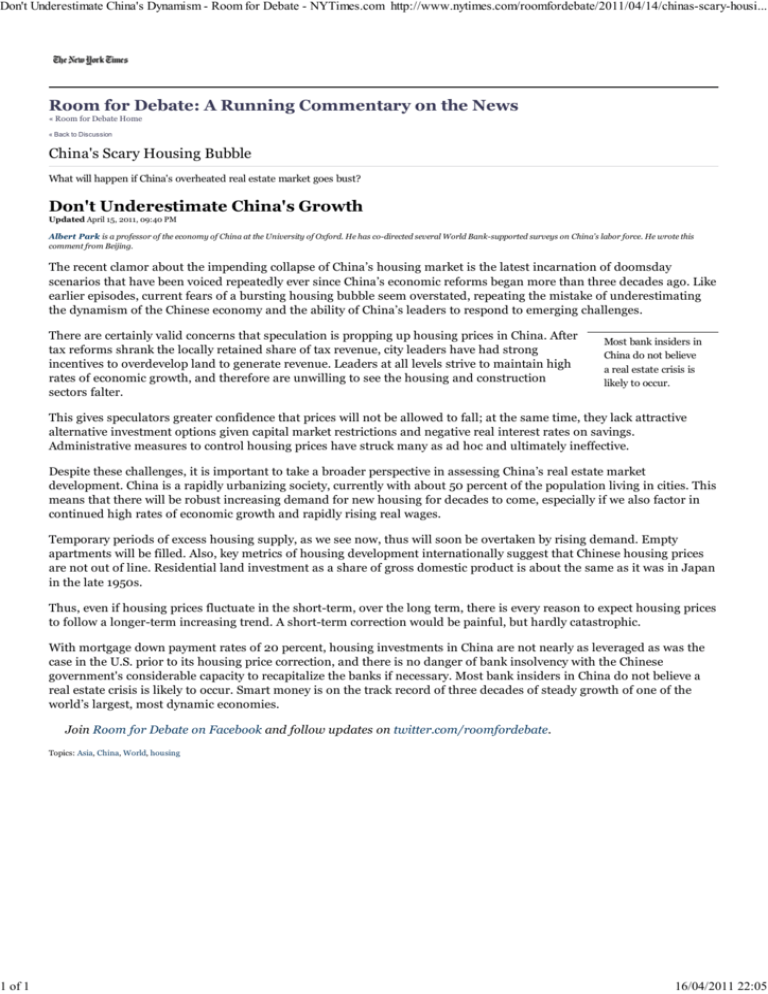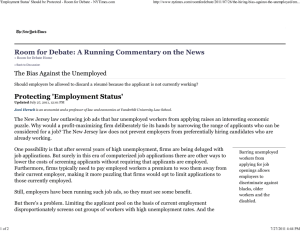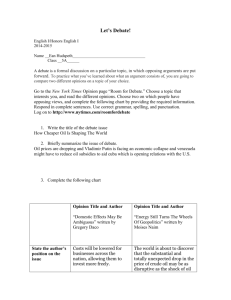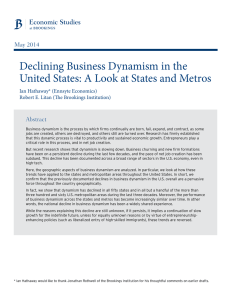Don't Underestimate China's Dynamism
advertisement

Don't Underestimate China's Dynamism - Room for Debate - NYTimes.com http://www.nytimes.com/roomfordebate/2011/04/14/chinas-scary-housi... Room for Debate: A Running Commentary on the News « Room for Debate Home « Back to Discussion China's Scary Housing Bubble What will happen if China's overheated real estate market goes bust? Don't Underestimate China's Growth Updated April 15, 2011, 09:40 PM Albert Park is a professor of the economy of China at the University of Oxford. He has co-directed several World Bank-supported surveys on China’s labor force. He wrote this comment from Beijing. The recent clamor about the impending collapse of China’s housing market is the latest incarnation of doomsday scenarios that have been voiced repeatedly ever since China’s economic reforms began more than three decades ago. Like earlier episodes, current fears of a bursting housing bubble seem overstated, repeating the mistake of underestimating the dynamism of the Chinese economy and the ability of China’s leaders to respond to emerging challenges. There are certainly valid concerns that speculation is propping up housing prices in China. After tax reforms shrank the locally retained share of tax revenue, city leaders have had strong incentives to overdevelop land to generate revenue. Leaders at all levels strive to maintain high rates of economic growth, and therefore are unwilling to see the housing and construction sectors falter. Most bank insiders in China do not believe a real estate crisis is likely to occur. This gives speculators greater confidence that prices will not be allowed to fall; at the same time, they lack attractive alternative investment options given capital market restrictions and negative real interest rates on savings. Administrative measures to control housing prices have struck many as ad hoc and ultimately ineffective. Despite these challenges, it is important to take a broader perspective in assessing China’s real estate market development. China is a rapidly urbanizing society, currently with about 50 percent of the population living in cities. This means that there will be robust increasing demand for new housing for decades to come, especially if we also factor in continued high rates of economic growth and rapidly rising real wages. Temporary periods of excess housing supply, as we see now, thus will soon be overtaken by rising demand. Empty apartments will be filled. Also, key metrics of housing development internationally suggest that Chinese housing prices are not out of line. Residential land investment as a share of gross domestic product is about the same as it was in Japan in the late 1950s. Thus, even if housing prices fluctuate in the short-term, over the long term, there is every reason to expect housing prices to follow a longer-term increasing trend. A short-term correction would be painful, but hardly catastrophic. With mortgage down payment rates of 20 percent, housing investments in China are not nearly as leveraged as was the case in the U.S. prior to its housing price correction, and there is no danger of bank insolvency with the Chinese government's considerable capacity to recapitalize the banks if necessary. Most bank insiders in China do not believe a real estate crisis is likely to occur. Smart money is on the track record of three decades of steady growth of one of the world’s largest, most dynamic economies. Join Room for Debate on Facebook and follow updates on twitter.com/roomfordebate. Topics: Asia, China, World, housing 1 of 1 16/04/2011 22:05









